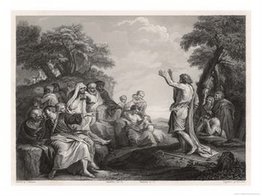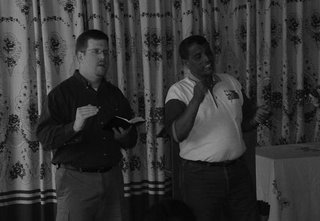What, you don't know?
There is a "movement" among Baptists these days. I think the word movement should indicate that there is a potential error afoot. Most movements seem to unintentionally breed cultish behavior by focusing too much on a particular teaching or passage. Even what may be called "good movements" such as the Great Awakening promoted a pendulum swing in the other direction. Jehovah's Witnesses, Mormons and every other Christian cult that I know of was the result of or a reaction to a "movement."
You will notice that I have avoided the word "revival." Revival carries with it too much baggage and the picture of a mad man in a three piece suit pounding a pulpit. Revival also implies a connection with our emotions. So, I believe most people prefer to call what is happening a movement. However, this term is not without its connotations as well.
The charismatic movement has birthed a great number of heretics as the emphasis has been on emotions, feelings, prophesy, manifestations and revelation. Not all charismatics are heretics, mind you. This movement affected Baptists in that many churches shifted to a more emotional worship style and preaching that was pointed at the perceived needs of the congregation (salvation and personal happiness) which is now termed "man-centered preaching." Evangelism focused less on the work of God and more on the "decision" of the man.
Today there is a growing minority among Baptists that are reacting to the emphasis on emotion by appealing to reformation theology. Reformation theology being the theology that resulted (or was recovered) in the reformation movements of the 1500s in Europe. Luther, Calvin and many others had restored the doctrines of the Church Fathers, and they focused heavily on the doctrines of grace, election, predestination and salvation. Today's reformist would claim that they are seeking "God-centered preaching."
Luther was a monk that never felt saved. He tried with all his might to be saved and it was not until he understood that the "just shall live by faith" that he was freed from the bondage of a works-based salvation. He was free indeed. His was not a passionless salvation, but rather one that was worked out in fear and trembling.
Calvin seems to have been much more intellectual and scholarly in his approach (Not that Luther was a dope, he did translate the entire Bible into German. He was just more "earthy.") Both men gloried in the doctrines of grace concerning salvation and the fact that God is the one who elects to save according to His will. It is God who gives faith and God who has predestined those who receive faith to be conformed to the image of Christ.
While many may think that it is election or predestination that causes fellow believers to hate the Reformation Movement, I would submit that it is neither. I have come to the conclusion that the movement is hated because it is imbalanced.
When I first read the passages (in a college Bible study) in Romans that concern God's election, I was offended. I had grown up with an imblanced view that I had saved myself. "I was sinking deep in sin far from the peaceful shore..." But, if the Apostle Paul was right I was not sinking -- I was "DEAD in sins and trespasses." I was not seeking God, but He was seeking me. The offense was replaced with joy and a sureness that I had never known concerning my own salvation. It was not my work, rather it was the work of God. It was not MY faith, nor my sincere prayer that saved me. It was faith that God gave me regardless of my emotion, sincerity or manifestations.
My zeal for good theology sent me gorging on words about God. The more I knew the more proud and arrogant I became. I began to hate the Church in America. I came to see most churches in America as fulfillments of the prophesy concerning Laodacea (although they were rich and had need of nothing they were poor, blind, miserable and naked). I gloried in the wrath of God that was being stored up for the sons of disobedience. I gloried that I was chosen before the foundations of the World. I hated the ignorant preachers who spent more time beating me up for not tithing or being a good person than speaking about Christ.
I was becoming full of good theology. I was so full that I could not eat another bite. The sweetness of God's love had become repulsive to me as I had feasted on His glory, wrath and election. Some years later, God brought me to a point of starvation.
The day that I was told that my daughter had brain damage all of my good theology flew right out the window. "God is without body, parts or passions." "God does everything for His own glory." Extra Biblical theological statements and maxims were useless to me. All I knew was the Gospel, and I wanted God to speak to me. I cried and moaned for hours. Quote Calvin to me, are you kidding me? God had deformed my child for His own egocentric glory?!? I didn't want to hear Calvin, Luther or Billy Graham for that matter. I had to hear from God Himself. I was not hungry; I was famished.
"Do you hate your daughter?"
"No, God. Maybe I am angry with you, but how could I hate her?"
"Then why do you hate my Church? You say you love me, but you hate my Bride. Therefore, my love does not live in you."
That word was so bitter, but God's bitter word was sweet to a starving man.
Scripture does not teach us that God so desired to glorify Himself that He sent Jesus. On the contrary His word teaches us that "God so LOVED the world that He gave His only begotten Son." God's nature is love. He is LOVE. Of course His love brings Him glory; everything He does is glorious. But God is a God of passion and love. This passionate God loved us so much that He took on flesh, humbled Himself and became a man. He disrobed His glory and manifest His very nature of Love by submitting to death on a cross. His love and power resurrected the dead body of Christ, and it is by His love that He gives faith and His Spirit to men, and conforms them to His image. It is because of His great love that He has done this. It is because of His great love that He has maimed my daughter's body and afflicted us with trials. He is working all things together for the good of them that love Him and are called according to His good purposes.
I fear God. I mean shaking in my shoes terrified. I fear Him because of His great love. He is the Lion of Judah that tears us to pieces. He is also the Lamb of God that loves us with a jealous and divine passion. He loves us so much that we share in the sufferings of Christ so that we might be more than converted -- we might be made new creatures and conformed to His glorious image.
We have been commanded to make disciples. We have been commanded to teach and reprove. But the greatest commandment is to love God and our neighbor as ourselves. If love is our motivation (as I believe it is God's), then everything that we do will be to the glory of God.
Why do some people hate the reformation movement? While it is full of zeal for good theology, it is often void of God's love, the love He has for Christ's body (His bride, the Church) and His passion that is all consuming.
 "Getting older does not mean you are wise, it just means you are old."
"Getting older does not mean you are wise, it just means you are old."
















.jpg)